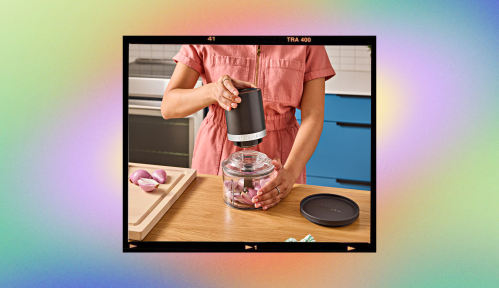You know that you're supposed to keep the fluids flowing when you're sick, but if the thought of plain water is totally off-putting, what should you have instead?
Experts in This Article
Los Angeles-based family medicine physician
founder of Griffin Acupuncture and Integrative Medicine in Oakland, California
integrative nutritionist
Turns out, there are actually some drinks that rehydrate you and help ease your symptoms, so you get more cold-fighting bang for your buck, says Los Angeles-based family medicine physician Nicholas Generales, D.O. The best part? You can make them with basic ingredients that you might already have on hand.
Here's what to drink when you have a cold, plus other tips for managing your symptoms at home.
What to drink when you have a cold
It's important to hydrate when you're sick for a couple of reasons. Falling short on fluids can lower your body's ability to fight off illnesses, increase your risk of dehydration, and cause your nose and throat to become dry, making congestion worse.1 If you have a fever, you're also sweating more, and that lost H20 needs to be replaced, Dr. Generales adds.
With that said, here are some homemade drinks—besides water—that can help relieve your cold symptoms.
1. Ginger scallion tea
Warm liquids can thin congestion-causing mucus in your nasal passages and help the gunk move through faster so your nose is less stuffy, Dr. Generales explains. Adding ginger and scallion—two spicy or sharp ingredients—to a warm drink is a good first step when you start to feel sniffly.
"Both fresh scallions and fresh ginger have an acrid or spicy quality, and in Chinese medicine, we say both of these herbs expel pathogens in part by inducing a mild sweat," says Lisa Franzetta, L.Ac., founder of Griffin Acupuncture and Integrative Medicine in Oakland, California. And the sharp taste of the drink may help clear nasal passages out just a bit faster.
How to make it: Add about 10 pieces of thinly sliced, unpeeled ginger and three sliced scallions to two cups of water (FYI, the white parts are the most pungent, so be sure to use them!) Bring to a boil, then reduce the heat and simmer for five minutes. Strain before drinking and feel free to drink this up to three times per day, Franzetta recommends.
2. Honey, lemon, and ginger soother
Honey is one of the best things to have when your throat is scratchy, outperforming standard treatment methods like cough syrup, according to an analysis published in BMJ Evidence-Based Medicine.2 Its thick, sticky texture can help coat your throat, while its anti-inflammatory, antimicrobial properties may help fight off germs, according to integrative nutritionist, Vanessa Imus, M.S., R.D.N.
You can have a straight spoonful of honey or try making a DIY tea with lemon and fresh ginger. The vitamin C from the lemon and the anti-inflammatory properties from the ginger may give your immune system an extra boost, Imus notes.
How to make it: Stir 2 teaspoons (tsp) of honey, 1 tsp of grated fresh ginger, and the juice of half a lemon in 12 to 16 ounces (oz) of hot water. Let the mixture steep for five to 10 minutes, and then drink. You can drink this concoction two or three times per day while keeping tabs on how your digestive system is handling the ginger. "Overdoing it may cause digestive upset for some people," Imus says.
3. Lemon and honey electrolyte drink
It's super important to replace lost fluids if you're sweating from a fever, vomiting, or experiencing diarrhea. Otherwise, you could risk becoming dehydrated—which is serious and can sometimes be life-threatening. When you're experiencing these symptoms, electrolyte drinks can do a better job than plain water, since they'll also re-up your stores of minerals like sodium, potassium, and sugar, Imus explains.
How to make it: Add 1 tablespoon (tbsp) lemon juice, 1 tsp honey, and a generous pinch of salt to 2 cups of water. Then, stir well to combine. Imus recommends to drink this as needed.
4. Warming spice tea
When you've got the chills, making a tea blended with warming spices like cinnamon, cardamom, cloves, and black pepper can bring the heat and help you feel more comfortable, Franzetta explains. Store-bought chai tea blends may get the job done too, since they usually include warming spices. Just steer clear of adding sugar or milk "which can exacerbate inflammation and mucus production in the body," she adds.
How to make it: Using a spice grinder or something to crush the spices (like a mortar and pestle), crush two sticks of whole cinnamon, two to three cardamom pods, and one to two whole cloves. (Note: pre-ground spices will also get the job done as long as they're relatively fresh.) Add the mixture, plus a one-eighth tsp of black pepper, to 3 cups of water. You'll want to let this simmer for 20 minutes. Franzeta suggests drinking this tea up to three times per day.
5. Turmeric golden milk
Turmeric golden milk originated in India thousands of years ago, and the beverage remains a staple today for illnesses. Imus likes to turn to a blend of turmeric, coconut milk, black pepper, and honey when she's feeling under the weather but still has a little bit of an appetite. Curcumin, the active compound found in turmeric, has anti-inflammatory properties that may support immune function and shorten the duration of a cold, according to a study published in the Journal of Dietary Supplements.3 Adding a pinch of black pepper also helps boost your absorption of the turmeric, she notes.
How to make it: Bring 1 cup of your choice of milk to a simmer, then stir in half a teaspoon of ground turmeric, 1 tsp of honey, and a pinch of black pepper. Imus recommends to drink once per day when you're sick.
6. Chicken broth
One of Dr. Generales' go-to liquids when he's sick is chicken broth. Not only is chicken broth rich in electrolytes like sodium, it's also been shown to exert anti-inflammatory activity that could potentially help you fight off those germs a little bit faster, per a study published in Poultry Science.4
How to make it: If you have the ingredients on hand and are up for simmering chicken bones, onions, carrots, etc. for a couple of hours until rich and flavorful, absolutely go for it. But if you're feeling low on energy (don't worry most people do when they're sick), broth from the store or your local soup or deli place will also get the job done. Just warm it up before drinking.
Other home remedies to treat a cold
While you're sipping away, here are some more things you can do to feel just a bit better when you have a cold:
- Steam it up: Hit the shower or bath, or pour boiling water into a bowl and lean over it with a towel draped over your head (carefully!) for several minutes. This can help relieve congestion and make it easier to breathe, according to Dr. Generales.
- Try a nasal rinse: Rinsing your nasal passages with saline water can help flush out gunky mucus and make it easier to breathe. You can use a neti pot filled with distilled boiled water and one-fourth teaspoon of non-iodized salt, or buy a sinus rinse kit. We like the one from NeilMed (100-pack, $16).
- Go to bed early: Rest helps your body fight off germs, so try to get plenty of it. Dr. Generales recommends getting at least eight hours of sleep per night.
- Try OTC meds as needed: Sometimes, home remedies might not give you as much relief as you'd hoped. Over-the-counter medications like Advil (ibuprofen) and Tylenol (acetaminophen) can help bring down a fever and improve fatigue. However, if your cold is getting worse, it's best to contact your healthcare provider for personalized advice and treatment options.
When to see a healthcare provider
As frustrating as a cold can be, mild symptoms often go away with some rest and home remedies. But, it's a good idea to let your provider know if your symptoms start to feel unmanageable or worsen. The Centers for Disease Control and Prevention (CDC) recommends seeing your provider if you have the following signs:
- Dehydration
- Fever that doesn't go away after three days
- Symptoms that improve and then worsen
- Difficulty breathing
Keep in mind: this list of signs isn't the end-all-be-all. If you have any concerning symptoms and want the support or advice of your healthcare provider, it's important to reach out to them as soon as you need them.
The bottom line
DIY teas, broths, and other warm beverages are a great way to stay hydrated and help relieve symptoms like congestion and coughing when you're sick. Stock up on some go-to ingredients now so you're prepared when you start to feel something coming on. And if the home remedies aren't helping, reach out to your healthcare provider for personalized recommendations and additional treatments, should you need them.
- Guppy, Michelle Pb et al. “Advising patients to increase fluid intake for treating acute respiratory infections.” The Cochrane database of systematic reviews vol. 2011,2 CD004419. 16 Feb. 2011, doi:10.1002/14651858.CD004419.pub3 ↩︎
- Abuelgasim, Hibatullah et al. “Effectiveness of honey for symptomatic relief in upper respiratory tract infections: a systematic review and meta-analysis.” BMJ evidence-based medicine vol. 26,2 (2021): 57-64. doi:10.1136/bmjebm-2020-111336 ↩︎
- Kuwabara, Yoshitaka et al. “Effects of Highly Bioavailable Curcumin Supplementation on Common Cold Symptoms and Immune and Inflammatory Functions in Healthy Japanese Subjects: A Randomized Controlled Study.” Journal of dietary supplements vol. 21,1 (2024): 71-98. doi:10.1080/19390211.2023.2185723 ↩︎
- Li, Zuyue et al. “Immunomodulatory effects of chicken soups prepared with the native cage-free chickens and the commercial caged broilers.” Poultry science vol. 101,10 (2022): 102053. doi:10.1016/j.psj.2022.102053 ↩︎
Sign Up for Our Daily Newsletter
Get all the latest in wellness, trends, food, fitness, beauty, and more delivered right to your inbox.
Got it, you've been added to our email list.











